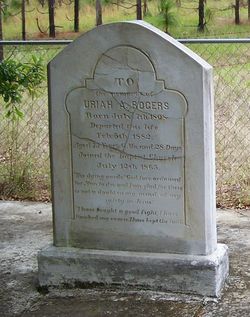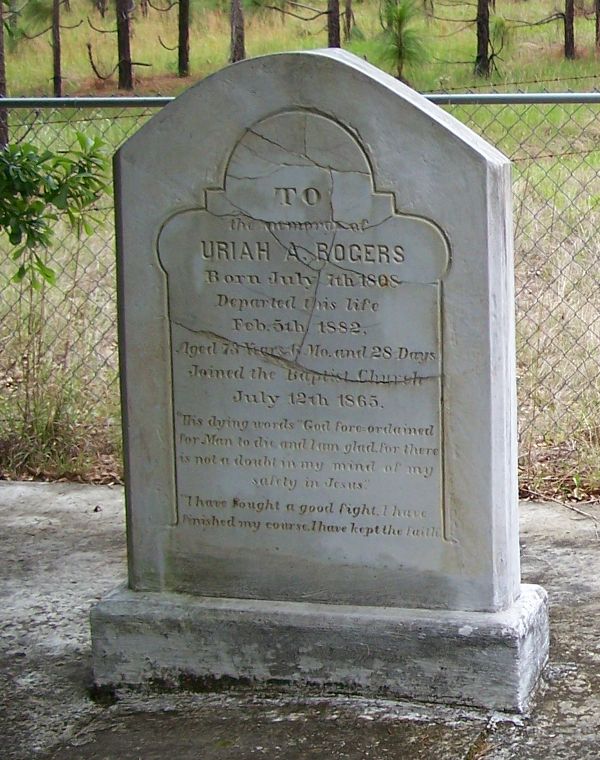On the Banks of the Canoochee: Uriah and Martha Brewton Rogers
By Dylan Edward Mulligan
On July 7, 1808, Uriah Allen Rogers, was born on a small farm on the forks of the Canoochee River and Lott's Creek—the property of his father, Thomas Rogers, who had settled in Bulloch County just after 1800. Uriah would go on to own a large segment of the Canoochee. Until 1914, everything north of that river was Bulloch County, everything south Tattnall.
Thomas Rogers (1780–After 1830) moved to Georgia from North Carolina and married Asha Everitt (1786–1850), the daughter of local planter John Everitt (1747–1841). Thomas and Asha settled in Bulloch County (now Evans) on the previously mentioned land. Everitt's plantation was across Lott's Creek. According to legend, Thomas went to Florida in 1830 and never returned, presumed to have been killed by Indians. Thomas was a millwright by trade, so it is expected that he left seeking work.
Thomas and Asha had two sons, Uriah Allen Rogers and Ervin Green Rogers (1818 – 1899). Upon John Everitt's death, Ervin inherited his plantation. When Asha died, Uriah inherited Thomas's plantation. It was there that Uriah Rogers established himself and raised his large family.
Uriah married Martha Brewton, born July 16, 1813, the daughter of Tattnall County pioneers Nathan and Nancy Fontaine Brewton. By the time of his death in 1855, Nathan had come to own approximately 9,000 acres, which made him one of the largest landowners in Tattnall County; however, his son-in-law would surpass these holdings. As the ancient Romans would say, Uriah was a novus homo (self-made man), as he transformed his father's small homestead into an agricultural empire covering over 10,000 acres of land and said to be worked by over thirty slaves—a considerable number for a planter in this area. Uriah built a plantation house near the place where he was born.
As two of the wealthiest citizens of the area, Uriah and his father-in-law no doubt watched with growing concern as the sectional crisis grew worse between the North and the South. Though Nathan would not live to see his homeland torn apart, his children and grandchildren would. In 1861, a convention was called in the state capital of Milledgeville to consider the question of secession. Tattnall County selected as her delegates Uriah's prominent brother-in-law, Benjamin Brewton, and wealthy planter Henry Solomon Strickland, a friend and relative of the Rogers and Brewton families. At the convention, they voted against secession.
By Confederate law, those who owned twenty or more slaves were exempt from serving in the army; Uriah met the requirements. His sons were exempt from military service; however, four of his sons voluntarily fought to protect their homeland and to defend their belief in a smaller government. They were: Thomas, Samuel, Alexander, and John. Thomas and Alexander joined Company B, 7th Georgia Cavalry Regiment—Thomas a private and Alexander a corporal. Both men were captured in battle and sent to Elmira, and both died as a result. Samuel served in Company H, 61st Regiment of the Georgia Infantry. John joined Company B, 6th Georgia Cavalry Regiment and was the last Confederate veteran to live in Evans County.
Uriah was a charter member of Antioch Baptist Church when it was established in 1845. In 1870, after continuous arguments over church finances, Uriah's son, John "Duffy" Rogers, led a large portion of the church's congregation to form a new church. John, himself a large landowner, donated a tract of land near his home at Bull Creek. It was only natural that the church should take the name Bull Creek Baptist Church when it was formally established in 1878. Also on the list of charter members are Uriah and Martha Rogers, and it is said that Uriah and John physically did much of the construction of the church. Another of Uriah's sons, Martin, started another church down the road with the help of his brother-in-law, William Washington Daniel, who married Uriah's daughter, Sarah. They named their church Bay Branch Baptist Church.
Eighteen children were born to Uriah and Martha: Thomas, Nancy (DeLoach), Nathan, Samuel, Pearsey, Clarissa (Southwell), Alexander, Asha (Hagin), James, Martin, John "Duffy," Sarah (Daniel), Martha (Smith), Elisha, Elijah, Joseph, Susanna (Strickland), and an unnamed infant. As his children married, Uriah would give them a large farm, mostly from among his Tattnall County holdings.
Uriah died at his home February 5, 1882, and Martha died January 25, 1890. The couple lay at rest in a private cemetery on their plantation on the banks of the Canoochee River and Lott's Creek, still flowing much the same as they did during Uriah's day. Today their descendants form one of the largest and most respected families in Evans, Tattnall, and Bulloch Counties.
Contributed by: Dylan Edward Mulligan
Uriah A. Rogers inherited the plantation of his father Thomas Rogers at the confluence of the Canoochee River and Lotts Creek. He owned approximately 10,000 acres of land in Bulloch and Tattnall (now Evans) counties.
On the Banks of the Canoochee: Uriah and Martha Brewton Rogers
By Dylan Edward Mulligan
On July 7, 1808, Uriah Allen Rogers, was born on a small farm on the forks of the Canoochee River and Lott's Creek—the property of his father, Thomas Rogers, who had settled in Bulloch County just after 1800. Uriah would go on to own a large segment of the Canoochee. Until 1914, everything north of that river was Bulloch County, everything south Tattnall.
Thomas Rogers (1780–After 1830) moved to Georgia from North Carolina and married Asha Everitt (1786–1850), the daughter of local planter John Everitt (1747–1841). Thomas and Asha settled in Bulloch County (now Evans) on the previously mentioned land. Everitt's plantation was across Lott's Creek. According to legend, Thomas went to Florida in 1830 and never returned, presumed to have been killed by Indians. Thomas was a millwright by trade, so it is expected that he left seeking work.
Thomas and Asha had two sons, Uriah Allen Rogers and Ervin Green Rogers (1818 – 1899). Upon John Everitt's death, Ervin inherited his plantation. When Asha died, Uriah inherited Thomas's plantation. It was there that Uriah Rogers established himself and raised his large family.
Uriah married Martha Brewton, born July 16, 1813, the daughter of Tattnall County pioneers Nathan and Nancy Fontaine Brewton. By the time of his death in 1855, Nathan had come to own approximately 9,000 acres, which made him one of the largest landowners in Tattnall County; however, his son-in-law would surpass these holdings. As the ancient Romans would say, Uriah was a novus homo (self-made man), as he transformed his father's small homestead into an agricultural empire covering over 10,000 acres of land and said to be worked by over thirty slaves—a considerable number for a planter in this area. Uriah built a plantation house near the place where he was born.
As two of the wealthiest citizens of the area, Uriah and his father-in-law no doubt watched with growing concern as the sectional crisis grew worse between the North and the South. Though Nathan would not live to see his homeland torn apart, his children and grandchildren would. In 1861, a convention was called in the state capital of Milledgeville to consider the question of secession. Tattnall County selected as her delegates Uriah's prominent brother-in-law, Benjamin Brewton, and wealthy planter Henry Solomon Strickland, a friend and relative of the Rogers and Brewton families. At the convention, they voted against secession.
By Confederate law, those who owned twenty or more slaves were exempt from serving in the army; Uriah met the requirements. His sons were exempt from military service; however, four of his sons voluntarily fought to protect their homeland and to defend their belief in a smaller government. They were: Thomas, Samuel, Alexander, and John. Thomas and Alexander joined Company B, 7th Georgia Cavalry Regiment—Thomas a private and Alexander a corporal. Both men were captured in battle and sent to Elmira, and both died as a result. Samuel served in Company H, 61st Regiment of the Georgia Infantry. John joined Company B, 6th Georgia Cavalry Regiment and was the last Confederate veteran to live in Evans County.
Uriah was a charter member of Antioch Baptist Church when it was established in 1845. In 1870, after continuous arguments over church finances, Uriah's son, John "Duffy" Rogers, led a large portion of the church's congregation to form a new church. John, himself a large landowner, donated a tract of land near his home at Bull Creek. It was only natural that the church should take the name Bull Creek Baptist Church when it was formally established in 1878. Also on the list of charter members are Uriah and Martha Rogers, and it is said that Uriah and John physically did much of the construction of the church. Another of Uriah's sons, Martin, started another church down the road with the help of his brother-in-law, William Washington Daniel, who married Uriah's daughter, Sarah. They named their church Bay Branch Baptist Church.
Eighteen children were born to Uriah and Martha: Thomas, Nancy (DeLoach), Nathan, Samuel, Pearsey, Clarissa (Southwell), Alexander, Asha (Hagin), James, Martin, John "Duffy," Sarah (Daniel), Martha (Smith), Elisha, Elijah, Joseph, Susanna (Strickland), and an unnamed infant. As his children married, Uriah would give them a large farm, mostly from among his Tattnall County holdings.
Uriah died at his home February 5, 1882, and Martha died January 25, 1890. The couple lay at rest in a private cemetery on their plantation on the banks of the Canoochee River and Lott's Creek, still flowing much the same as they did during Uriah's day. Today their descendants form one of the largest and most respected families in Evans, Tattnall, and Bulloch Counties.
Contributed by: Dylan Edward Mulligan
Uriah A. Rogers inherited the plantation of his father Thomas Rogers at the confluence of the Canoochee River and Lotts Creek. He owned approximately 10,000 acres of land in Bulloch and Tattnall (now Evans) counties.
Inscription
Departed this life Feb. 5, 1882. Age 73 years, 6 months and 28 days.
Joined the Baptist Church July 12th, 1865.
His dying words: God Fore-ordained for Man to die and I am glad for there is not a doubt in my mind of my safety with Jesus."
" I have fought a good fight. I have finished my course. I have kept the faith."
Family Members
-
![]()
Thomas Everette Rogers
1832–1864
-
![]()
Nancy Rogers DeLoach
1833–1915
-
![]()
Samuel Brewton Rogers Sr
1836–1878
-
![]()
Mrs Clarissa E Rogers Southwell
1839–1878
-
![]()
Alexander C Rogers
1841–1865
-
![]()
Asha Eveline Rogers Hagin
1842–1922
-
![]()
James Jackson Rogers
1844–1914
-
![]()
Martin E. Rogers
1846–1914
-
![]()
John "Duffy" Rogers
1847–1941
-
![]()
Sarah Frances Rogers Daniel
1851–1924
-
![]()
Martha Emily Rogers Smith
1852–1941
-
Elisha Rogers
1854–1928
-
Elijah Rogers
1856 – unknown
-
![]()
Susannah Mozelle "Susan" Rogers Strickland
1860–1943
Advertisement
Explore more
Sponsored by Ancestry
Advertisement

















